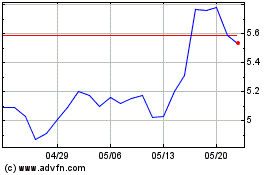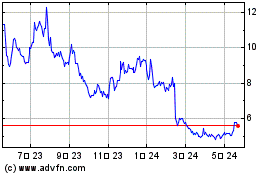- An updated analysis showed that LUPKYNIS is a cost-effective
treatment for lupus nephritis, on par with other interventions for
diabetes, blood pressure, and hyperlipidemia in adult patients with
active lupus nephritis (LN).
- Additional data on baseline demographics from the Enlight-LN
registry and safety and efficacy data of LUPKYNIS will also be
presented.
Aurinia Pharmaceuticals Inc. (NASDAQ: AUPH) (Aurinia or the
Company), today announced the presentation of results from an
updated cost-effective analysis of LUPKYNIS (voclosporin), a second
generation calcineurin inhibitor (CNI), at the annual National
Kidney Foundation (NKF) Spring Clinical Meeting 2024 taking place
in Long Beach, CA, May 14-18. The Company will also share
additional data from its AURORA clinical program.
Economic modeling by the Institute for Clinical and Economic
Review (ICER) in March 2021 demonstrated the cost-effectiveness of
LUPKYNIS in adults with active lupus nephritis (LN). An updated
cost-effectiveness analysis demonstrated that LUPKYNIS continues to
be a cost-effective treatment for lupus nephritis (LN).
Cost-effectiveness was assessed with the ICER AnalyticsTM LN model
and the majority of model assumptions from the original analysis
were consistent with the 2021 analysis. Updated inputs in this new
analysis included the 2023 cost of LUPKYNIS, the duration of
treatment for people who did not respond to treatment, and the cost
of treating LN patients with end-stage kidney disease.
LUPKYNIS is substantially below ICER’s willingness-to-pay
threshold of $150,000 in adult patients with active LN. The
incremental cost of the treatment was $88,076 per quality adjusted
life year (QALY) and $77,643 per equal value of life year gained
(evLYG) in patients with active LN.
ICER uses a common set of cost-effectiveness thresholds for all
assessments, including those for treatments of ultra-rare
disorders, providing a uniform range of results from $50,000 to
$200,000 per QALY and per evLYG for all assessments. The QALY is
the standard for measuring how well various medical treatments
lengthen and/or improve patients’ lives, and therefore the metric
has served as a fundamental component of cost-effectiveness
analyses. To complement the use of the QALY, ICER’s reports also
include a calculation of evLYG, which evenly measures any gains in
length of life, regardless of the treatment’s ability to improve
patients’ quality of life.
Moreover, in a smaller subgroup analysis of Black, Hispanic, and
Latino patients — a population disproportionately affected by LN —
cost-effectiveness was on par with other interventions for
diabetes, blood pressure, and hyperlipidemia. The incremental cost
of the treatment per QALY was $77,436 and was $67,828 per evLYG in
Black, Hispanic, and Latino patients.
“People living with lupus nephritis must be able to access
clinically meaningful treatment options to manage the severity of
the disease. When considering LUPKYNIS for their LN patients,
physicians can take this cost-effectiveness analysis into account,
along with long-term data from our AURORA clinical program, which
showed that LUPKYNIS, in combination with MMF and steroids,
provided sustained complete renal response and reductions in
steroid use over three years of treatment, compared to MMF and
steroids alone,” said Dr. Greg Keenan, Chief Medical Officer of
Aurinia.
An interim assessment of baseline demographics and clinical
characteristics of patients currently enrolled in the prospective,
observational Enlight-LN registry found that this initial cohort of
patients is reflective of the larger LN population in the US. The
Enlight-LN registry, designed to characterize the real-world
effectiveness profile and usage patterns of LUPKYNIS, is enrolling
patients in the US.
A propensity analysis of the Aspreva Lupus Management Study
(ALMS), AURA-LV, and AURORA 1 studies suggested that LUPKYNIS plus
standard of care demonstrated superior reductions in proteinuria
and reduced patient exposure to toxicities compared with higher
doses of mycophenolate mofetil (MMF) and glucocorticoids or
cyclophosphamide and glucocorticoids alone. Safety and efficacy
outcomes for propensity-matched patients with active LN from the
AURA-LV plus AURORA 1 studies were assessed at three and six
months. Patients who received the LUPKYNIS -based regimen
experienced reductions in exposure to glucocorticoids and more
patients achieved a >50% urine protein creatinine ratio
reduction from baseline compared to their propensity-matched
counterparts in ALMS.
Following are the titles and authors of Aurinia’s presentations
at NKF’s Spring Clinical Meeting 2024:
Title: Evaluating the
Cost-effectiveness of Voclosporin in the United States for the
Treatment of Lupus Nephritis Authors: Ernie Lee,
Victoria Atencio, Ronald Flauto, Vanessa Birardi, Lisa Kennedy
Location: Exhibit Hall A, The Long Beach Convention &
Entertainment Center
Title: Enlight-LN Registry:
Baseline Demographics and Clinical Characteristics of an Initial
Cohort of Patients Treated with Voclosporin for Lupus Nephritis in
the United States Authors: Stephen Myers,
Michelle Zubrycki, Lily Cipolla, Ron Flauto Location:
Exhibit Hall A, The Long Beach Convention & Entertainment
Center
Title: A propensity Analysis of
AURA-LV plus AURORA 1 vs ALMS to Compare a Voclosporin-based,
Triple Immunotherapy Regimen to High-dose Glucocorticoid-based
Immunosuppressive Therapy Authors: Kenneth
Kalunian, Anca Askanase, Maria Dall'Era, Neil Solomons, Matt
Truman, Lucy S Hodge, Ernie Yap Location: Exhibit Hall A,
The Long Beach Convention & Entertainment Center
About LUPKYNIS LUPKYNIS (voclosporin) is the first U.S.
Food and Drug Administration and European Commission approved oral
medicine for the treatment of adult patients with active lupus
nephritis (LN). LUPKYNIS is a second generation calcineurin
inhibitor (CNI) with a dual mechanism of action, acting as an
immunosuppressant through inhibition of T-cell activation and
cytokine production and promoting podocyte stability in the kidney.
The AURORA Clinical Program, comprised of the AURORA 1 pivotal
trial and AURORA 2 extension trial, demonstrated the importance of
LUPKYNIS plus standard of care to preserve kidney health in
patients with active LN without reliance on chronic high-dose
glucocorticoids. It is the only clinical program to include three
years of LN treatment and follow-up with mycophenolate mofetil
(MMF) and steroids.
About Lupus Nephritis Lupus Nephritis (LN) is a serious
manifestation of systemic lupus erythematosus (SLE), a chronic and
complex autoimmune disease. LN affects approximately 120,000 people
in the U.S. and disproportionately affects women and people of
color. People living with LN have high unmet needs and often face
significant barriers to optimal care. If poorly controlled, LN can
lead to permanent and irreversible tissue damage within the kidney.
Medical guidelines recommend that all SLE patients receive routine
LN screenings at every visit. Guidelines also note that delaying LN
diagnosis has profound prognostic repercussions. Yet, research
shows that approximately 50% of SLE patients are not screened for
LN and 77% of people with LN go untreated. Aurinia is committed to
improving health outcomes for people living with LN by educating
patients and providers on the critical need for routine screening
and transformative therapies that can help improve health
outcomes.
About Aurinia Aurinia Pharmaceuticals is a fully
integrated biopharmaceutical company focused on delivering
therapies to treat targeted patient populations with high unmet
medical needs that are impacted by autoimmune, kidney and rare
diseases. In January 2021, the Company introduced LUPKYNIS
(voclosporin), the first FDA-approved oral therapy dedicated to the
treatment of adult patients with active lupus nephritis. The
Company’s head office is in Edmonton, Alberta, its U.S. commercial
office is in Rockville, Maryland. The Company focuses its
development efforts globally.
INDICATION AND IMPORTANT SAFETY INFORMATION
INDICATION LUPKYNIS is indicated in combination with a
background immunosuppressive therapy regimen for the treatment of
adult patients with active LN. Limitations of Use: Safety and
efficacy of LUPKYNIS have not been established in combination with
cyclophosphamide. Use of LUPKYNIS is not recommended in this
situation.
IMPORTANT SAFETY INFORMATION
BOXED WARNINGS: MALIGNANCIES AND SERIOUS INFECTIONS
Increased risk for developing malignancies and serious
infections with LUPKYNIS or other immunosuppressants that may lead
to hospitalization or death.
CONTRAINDICATIONS: LUPKYNIS is contraindicated in
patients taking strong CYP3A4 inhibitors because of the increased
risk of acute and/or chronic nephrotoxicity, and in patients who
have had a serious/severe hypersensitivity reaction to LUPKYNIS or
its excipients.
WARNINGS AND PRECAUTIONS
Lymphoma and Other Malignancies: Immunosuppressants,
including LUPKYNIS, increase the risk of developing lymphomas and
other malignancies, particularly of the skin. The risk appears to
be related to increasing doses and duration of immunosuppression
rather than to the use of any specific agent.
Serious Infections: Immunosuppressants, including
LUPKYNIS, increase the risk of developing bacterial, viral, fungal,
and protozoal infections, including opportunistic infections. This
may lead to serious, even fatal, outcomes.
Nephrotoxicity: LUPKYNIS, like other calcineurin
inhibitors (CNIs), may cause acute and/or chronic nephrotoxicity.
The risk is increased if administered with drugs associated with
nephrotoxicity. Monitor eGFR regularly.
Hypertension: Hypertension is a common adverse reaction
of LUPKYNIS therapy that may require antihypertensive therapy.
Monitor blood pressure regularly.
Neurotoxicity: LUPKYNIS, like other CNIs, may cause
neurotoxicities that if severe can include posterior reversible
encephalopathy syndrome, delirium, seizure, and coma; others
include tremor, paresthesia, headache, and changes in mental status
and/or motor and sensory functions. Monitor for neurologic
symptoms.
Hyperkalemia: Hyperkalemia, which may be serious and
require treatment, has been reported. Concomitant use of agents
associated with hyperkalemia may increase the risk for
hyperkalemia. Monitor serum potassium periodically.
QTc Prolongation: LUPKYNIS prolongs the QTc interval in a
dose-dependent manner when dosed higher than the recommended lupus
nephritis therapeutic dose. The use of LUPKYNIS in combination with
other drugs that are known to prolong QTc may result in clinically
significant QT prolongation.
Immunizations: Avoid the use of live attenuated vaccines
during treatment with LUPKYNIS. Inactivated vaccines noted to be
safe for administration may not be sufficiently immunogenic during
treatment with LUPKYNIS.
Pure Red Cell Aplasia: Cases of pure red cell aplasia
have been reported in patients treated with another CNI. If PRCA is
diagnosed, consider discontinuation of LUPKYNIS.
ADVERSE REACTIONS The most common adverse reactions
(>3%) were glomerular filtration rate decreased, hypertension,
diarrhea, headache, anemia, cough, urinary tract infection,
abdominal pain upper, dyspepsia, alopecia, renal impairment,
abdominal pain.
Drug-Drug Interactions: Avoid co-administration of
LUPKYNIS and strong CYP3A4 inhibitors or with strong or moderate
CYP3A4 inducers. Co-administration of LUPKYNIS with strong CYP3A4
inhibitors is contraindicated. Reduce LUPKYNIS dosage when
co-administered with moderate CYP3A4 inhibitors. Avoid use of
LUPKYNIS with strong or moderate CYP3A4 inducers.
SPECIFIC POPULATIONS
Pregnancy: Avoid use of LUPKYNIS.
Lactation: Consider the benefits and risks of LUPKYNIS
and possible risks to the fetus when prescribing LUPKYNIS to a
lactating woman.
Renal Impairment: LUPKYNIS is not recommended in patients
with baseline eGFR ≤45 mL/min/1.73 m2 unless benefit exceeds risk.
If used in this population, reduce LUPKYNIS dose.
Hepatic Impairment: For mild or moderate hepatic
impairment, reduce LUPKYNIS dose. Avoid use with severe hepatic
impairment.
Please see Prescribing Information, including Boxed Warning, and
Medication Guide for LUPKYNIS.
References
- Lee E. et al. Evaluating the Cost-effectiveness of Voclosporin
in the United States for the Treatment of Lupus Nephritis.
Presented at the National Kidney Foundation’s Spring Clinical
Meeting, 2024, Long Beach, CA.
- Myers S. et al. Enlight-LN Registry: Baseline Demographics and
Clinical Characteristics of an Initial Cohort of Patients Treated
with Voclosporin for Lupus Nephritis in the United States.
Presented at the National Kidney Foundation’s Spring Clinical
Meeting, 2024, Long Beach, CA.
- Kalunian K. et al. A propensity Analysis of AURA-LV plus AURORA
1 vs ALMS to Compare a Voclosporin-based, Triple Immunotherapy
Regimen to High-dose Glucocorticoid-based Immunosuppressive
Therapy. Presented at the National Kidney Foundation’s Spring
Clinical Meeting, 2024, Long Beach, CA.
View source
version on businesswire.com: https://www.businesswire.com/news/home/20240514274649/en/
Media and Investor Inquiries: Andrea Christopher
Corporate Communications & Investors Relations
achristopher@auriniapharma.com ir@auriniapharma.com
Aurinia Pharmaceuticals (NASDAQ:AUPH)
過去 株価チャート
から 3 2025 まで 4 2025

Aurinia Pharmaceuticals (NASDAQ:AUPH)
過去 株価チャート
から 4 2024 まで 4 2025
